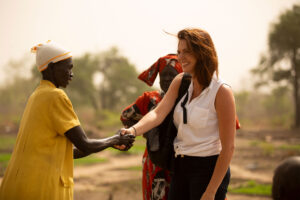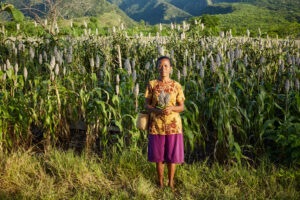
Obakki – A Purpose-Led Lifestyle Brand and Foundation
Founder Treana Peake, supports artisan partnerships and funds development work through the Obakki Foundation.
United States
Mood of Living June 14, 2017
Ann Cooper has worked in food for more than 40 years. Her hugely successful professional career has taken her to restaurants around the country and she has written cookbooks including ‘Lunch Lessons’ and ‘A Woman’s Place Is In The Kitchen,’ a study of the evolution of female chefs. With a passion for food and growing interest in sustainability, eventually Ann turned her interests to advocating for healthy eating for children. Following collaboration with the Berkeley school district, she set up the Chef Ann Foundation. The foundation’s initiatives are at work across the United States, making true and lasting changes to school meals with an impact being felt far beyond the classroom.
Mood of Living: How and where did you get your start in your professional life with food? What was your greatest source of inspiration as a chef and author?
Ann Cooper: So I kind of fell into food. I was not yet 20 years old and I decided that my occupation was going to be ski bum. I hitchhiked from Boston to Telluride, Colorado to pursue this occupation, never having worked or cooked. When I got to Telluride, realizing I needed money and after I called home and my parents said ‘no way,’ I talked my way into an assistant breakfast cook position. There I fell in love with food. I just sort of fell into the job but I really was good at it and had a passion for it. That was the beginning. I then started my own baking company and went to the Culinary Institute in 1977, that was my start.
I was a white tablecloth, semi-celebrity chef for almost 30 years. I cooked all over this country. I opened a restaurant in London and went around the world as a chef on a cruise ship for two years. While I was at the Putney Inn in Vermont, I started getting into sustainability and I was writing books.
MoL: You have already made such a contribution to your field. What motivated you to develop the Chef Ann Foundation to focus on healthy eating for children?
A.C: One of the books I wrote early on was called Bitter Harvest and it was about sustainability and who owns the food supplies. When it was about to come out, I got a call from The Ross School in New York, a very alternative school, asking if I would take over their food programme. I originally said no, I’m not a lunch lady. They persuaded me to come down and visit and I fell in love with the idea of the Ross School that is committed to Steve Ross’s legacy by aiming to change education in America. One of the core values is healthy eating and that’s how I got into school food.
In 2009 I started my foundation which was a way to help school districts all across the country segue from highly processed foods to scratch-cooked foods. The situation in so many places is not OK and I feel we can all make a difference here teaching about a healthy earth, healthy food and healthy kids. The thing that’s just really important is that food should be a birthright. We need to feed all our kids, there should be no hungry kids. This is one of the social justice issues of our time. And I think that now, more than ever, it’s important to make sure that we take care of our children.
MoL: What social impact do you hope to have on the world through the Chef Ann Foundation? What is the Foundation’s mission going forward and how would you love to see it affect change?
A.C: Right now the Chef Ann Foundation works in every state in the nation, we’re reaching 2.7 million kids. Our mission overall is to change school food from highly processed to scratch-cooked by introducing salad bars, veggie education and working with schools as they plan for healthy living. Our latest project, The Lunchbox, is making resources available online for school districts to make these changes themselves. Michelle Obama’s work and the whole department of USCA really made positive change in school food. I don’t know what will happen now but the last eight years has really seen a hugely positive impact on kid’s health.
We are seeing kids changing what they eat. And changing what kids eat in school also makes a difference in what they eat at home. We’ve had parents tell us that their kids eat differently now and they’re trying new things. It’s all paired with education, cooking with kids, gardening with kids and sitting down to eat. Kids bring that shared, social experience home and that changes everything.
It’s important to get people to think about these issues. It’s important to be talking to people, being in that moment and sharing what this means and what it means to our children and their future. Sharing my passion just comes out. It’s really easy for me to advocate for making sure kids are healthier.
MoL: Outside your professional work, how do you explore creativity? What does quality of life mean to you?
A.C:
I have such a passion for cooking and also for growing food in my large garden. I go to farmer’s markets and talk to farmers. I want to continue to make sure the world has the best possible food, as well as myself.
Part of quality of life, besides friends and family, is the outdoors. I ski, cross-country ski and snowshoe. My other big sports are bicycling, I have 4 bikes so I do a lot of riding, and also hiking and trekking around the world. Part of the way I balance my world is doing a lot of outdoor activity, it feeds my soul.
Photography courtesy by Ann Cooper

Founder Treana Peake, supports artisan partnerships and funds development work through the Obakki Foundation.

Executive Director Kevin Conrad is credited for his many initiatives through Coalition for Rainforest Nations that help unite and sustain rainforests around the world.

Global Greengrants Fund is a charitable foundation that supports grassroot causes to solve environmental harm and social injustice across the globe.